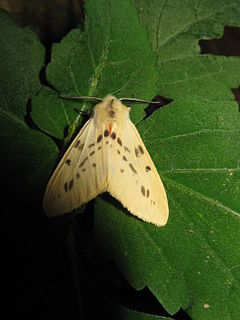
Lemyra is a genus of tiger moths in the family Erebidae. The genus contains many species from East and South Asia, Sundaland and Australia. It was described by Francis Walker in 1856.
Lemyra maculifascia is a moth of the family Erebidae. It was described by Francis Walker in 1855. It is found in China, Indonesia, Timor, the Philippines, New Guinea and Australia. It is found in secondary habitats, including bush, clearings in primary forests and plantations, from the sea level up to elevations of about 1,200 meters.
Lemyra philippinica is a moth of the family Erebidae. It was described by Thomas in 1990. It is found on the Philippines. It is found in primary and secondary habitats, ranging from the lowlands up to altitudes of about 2,000 meters.
Lemyra punctatostrigata is a moth of the family Erebidae. It was described by George Thomas Bethune-Baker in 1904. It is found in New Guinea and on Seram. The habitat consists of areas near river systems at moderate altitudes.
Lemyra alleni is a moth of the family Erebidae. It was described by Thomas in 1990. It is found in Thailand.
Lemyra anormala is a moth of the family Erebidae. It was described by Franz Daniel in 1943. It is found in China, Burma and Vietnam.
Lemyra boghaika is a moth of the family Erebidae. It was described by Yuri A. Tshistjakov and Yasunori Kishida in 1994. It is found in the Russian Far East and Korea. It is probably also present in China.
Lemyra copiosa is a moth of the family Erebidae. It was described by Thomas in 1990. It is found on Sumatra.
Lemyra dejongi is a moth of the family Erebidae. It was described by Thomas in 1990. It is found on Java.
Lemyra diluta is a moth of the family Erebidae. It was described by Thomas in 1990. It is found in China.
Lemyra excelsa is a moth of the family Erebidae. It was described by Thomas in 1990. It is found in India (Sikkim) and Tibet, China.
Lemyra praetexta is a moth of the family Erebidae. It was described by Karel Černý in 2011. It is found on the Philippines, where it has been recorded only from the mountains of Palawan.
Lemyra hyalina is a moth of the family Erebidae. It was described by Cheng-Lai Fang in 1990. It is found in China in Guangxi and Guangdong.
Lemyra jeremyi is a moth of the family Erebidae. It was described by Thomas in 1990. It is found on Sulawesi.
Lemyra khasiana is a moth of the family Erebidae. It was described by Thomas in 1990. It is found in eastern India.
Lemyra kobesi is a moth of the family Erebidae. It was described by Thomas in 1990. It is found on Sumatra.
Lemyra melanosoma is a moth of the family Erebidae. It was described by George Hampson in 1894. It is found in China, Pakistan, eastern India, Myanmar and Thailand.
Lemyra nigricosta is a moth of the family Erebidae. It was described by Thomas in 1990. It is found in Taiwan.
Lemyra nocturna is a moth of the family Erebidae. It was described by Thomas in 1990. It is found on Sumatra.

Lemyra stigmata is a moth of the family Erebidae. It was described by Frederic Moore in 1865. It is found in China, Pakistan, India, Nepal, Bhutan, Myanmar, Thailand and Vietnam.

